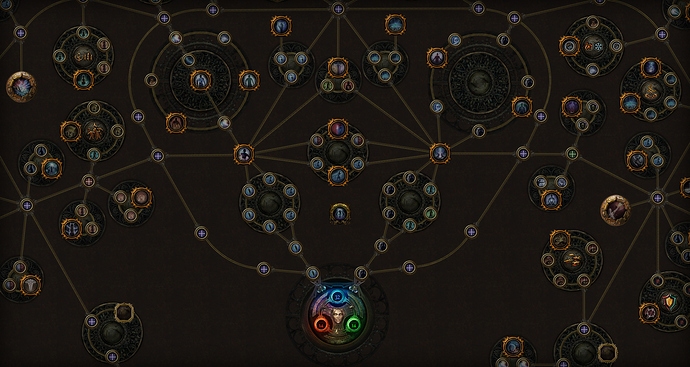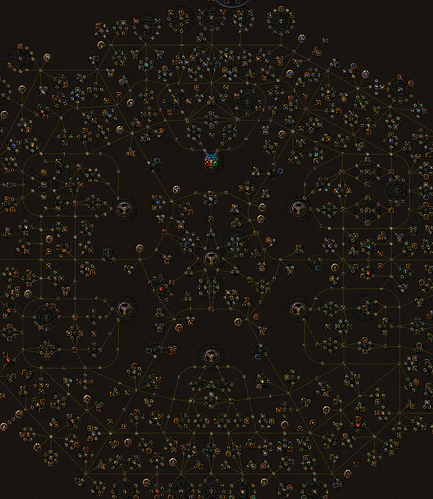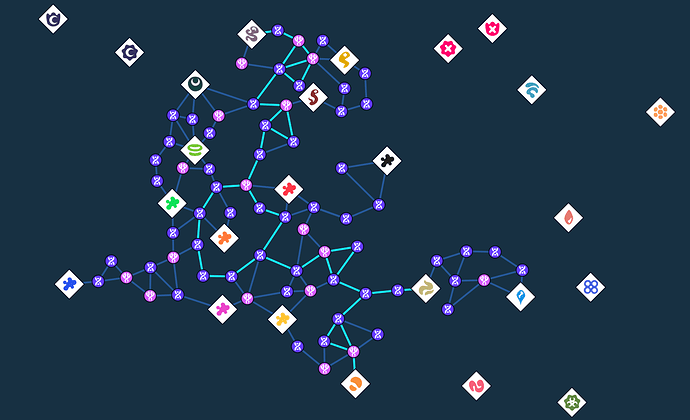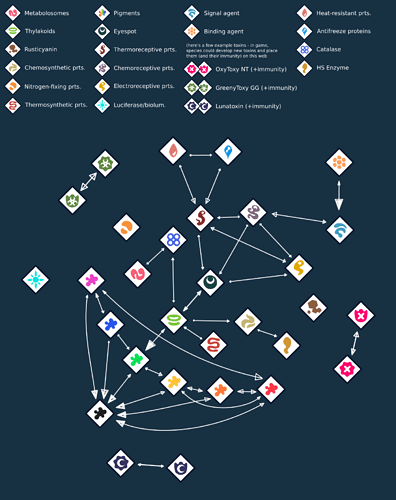I’d like to elaborate a lil more on my last post, specifically my ideas on a non-random, tech tree-like alternative that accomplishes a similar thing.
Basically, it would be allow players to unlock what proteins they want, provided they work toward it and put the necessary resources in. Also, I wanted proteins that are similar to ones you already have unlocked to be less expensive (for instance, it’s not too hard to go from chlorophyll to an eyespot).
So when looking up tech trees I could use as a reference, I came across Path of Exile’s passive skill tree:
Here each little node increases stats in some way, while the larger nodes have larger, more interesting benefits, while still others may even offer some drawbacks alongside their buffs in order to offer more interesting gameplay.
And it is massive.
But that’s because every character class uses the same skill tree, meaning even if you’re one class, you can still unlock nodes of another, it just might cost a lot more and leave your own class’ native skills neglected.
I tried (emphasis on tried) to translate this concept to a Thrive protein unlock tree, with a degree of randomness, but I’m not particularly fond of it.
(note how a handful of nodes and proteins are unlocked)
Since, as Nick said, there isn’t really any progression to unlocking proteins, you can’t really gradually unlock buffs here. (Organelle upgrading is a thing, but I imagine that would take place somewhere other than here.)
So instead I turned the smaller nodes (small circular DNA icons) into simple steps, which offer no benefits when unlocked, that you have to go through in order to unlock the proteins (diamond-shaped symbols).
The purple DNA nodes are able to be unlocked when at least one of their neighbors are unlocked (pretty standard), while the pink DNA nodes work sort of like a weird omnidirectional AND gate, requiring at least two unlocked neighbors in order to be unlocked themselves. Proteins can be unlocked similar to the purple DNA nodes, probably for an extra hefty MP price.
I didn’t really like this concept because of how messy it ended up being, and how arbitrary and nonsensical some of the relations are (for instance, there’s not really any reason why a toxin should be easier to unlock once you have eyespots, but if the two happen to be close together on the tree then they will be.) This could be fixed by designing the tree super intentionally, but that would be harder to randomize (meaning experienced players won’t need to strategize as much – it’s not a necessary feature, but still) and even still it could be hard to avoid.
So I scrapped that idea for now, and decided to make a simple web showing which relations each protein should have.
Here, the size of an arrow’s head corresponds to how easy it is to unlock a certain protein if the protein on the other end of an arrow is unlocked.
For instance, it should be pretty easy to evolve inert green pigment if you already have chlorophyll unlocked, but if you only have green pigment unlocked it’ll be much harder to unlock chlorophyll with photosynthetic properties. And eyespots will be easier to unlock if you have both chlorophyll and any other sort of receptor already unlocked. And other proteins, like rusticyanin, or some toxins, or bioluminescent enzymes like luciferase, are so unlike others that nothing really contributes to making evolving them easier.
I mostly made this web as a guide for other concepts, but looking at it I think it could also guide a simple, MP unlock system. Any protein would by default take 100 MP to unlock, but if you have any related proteins (connected by arrows) also unlocked, then the MP cost will be reduced depending on the size of the arrow head.
I’m not too sure about this though. Even being able to sacrifice a single editor session to unlock any protein for 100 MP feels too generous. As I suggested before, perhaps there could be a delay between unlocking proteins, and some proteins would have longer delays than others (and these delays, too, would be shortened by having related proteins unlocked). Or perhaps the proteins by default would cost more than 100 MP, and you’d have to pay the price over the course of multiple editor sessions. (though that kinda goes against the idea of proteins evolving randomly - spending MP gives the implication that something is going on behind the scenes in the DNA)
I’d also like to mention Deus’ enzyme concept on the community forums – it’s fairly old, but I saw it mentioned on the Thrive development poll thread and I think it might be worth a look.

The concept gives you a bunch of enzymes you can level up in order to grant and improve resistances to certain compounds and environmental conditions. The player seems to have access to all of them at once, but will usually only want to spend points on ones that are relevant to their current situation. (I don’t think there would be any reason, such as genome space or energy costs, to revert already evolved enzymes, meaning a bunch of non-chemosynthesizing cells living near the surface would have no reason to drop their hydrogen sulfide enzymes.)



